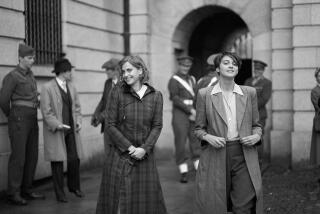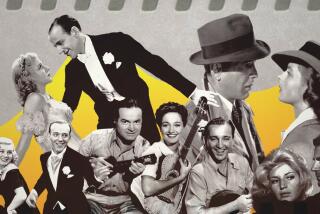Summer Bonanza of Art-Film Videos
- Share via
Summer may be the time for escapist movie fare, but two boutique video companies are going against the grain by releasing acclaimed foreign films for the discerning viewer.
Home Vision is offering the restored, digitally remastered director’s cut of Federico Fellini’s Oscar-winning 1957 drama, “Nights of Cabiria” ($30). Giulietta Masina, Fellini’s wife, is heartbreaking in this poignant story of a waif-like prostitute who eternally hopes for a better life as she works the streets of Rome after World War II.
The crisp print features seven additional minutes that had been censored by the Catholic Church when the film was initially released.
The edition also includes an interview with Fellini’s longtime assistant, Dominique Delouche, the original theatrical trailer and the trailer for the 1998 re-release. “Nights of Cabiria” became the basis for the hit musical “Sweet Charity.”
Also new from Home Vision for Fellini buffs is the remastered, letterbox edition of his 1984 drama, “And the Ship Sails On” ($30), a loving yet critical look at the passing of Europe’s high society on the eve of World War I.
On Tuesday, Kino on Video releases three well-respected films from Eastern Europe ($25 each): Andrzej Wajda’s “Siberian Lady Macbeth” (1962), Istvan Szabo’s “The Father” (1966) and Miklos Jansco’s “The Red and the White” (1968). These films are representative of works from Europe’s New Wave that were overshadowed by the French and Italian cinema of the day.
Wajda’s “Siberian Lady Macbeth’ is relentlessly dark and depressing, but well worth watching. The drama deals with the evil Katarina (Olivera Markovic), a ruthless woman living in a dank, small town who will let nothing threaten her affair with a mysterious, handsome drifter (Ljuba Tadic). She ends up murdering her overbearing father-in-law with rat poison and bumping off her brute of a husband. But Katarina’s deadly machinations get the better of her and her lover, whom she discovers is not quite as devoted to her as she thought.
Aleksandar Sekulovic supplied the evocative black-and-white cinematography, and the memorable score was drawn from the works of Shostakovich. The letterbox print has been digitally formatted from a 35mm archive print.
Winner at the 1966 Moscow Film Festival, Szabo’s “The Father” is an inspired drama about a little boy who escapes from the grimness of post-World War II Hungary by fantasizing that his late father was everything from a freedom-fighter to a world traveler to a decorated hero. But as the young boy grows into manhood during the 1956 Hungarian revolution, he and his girlfriend begin to have doubts about the actions of their parents’ generation. Szabo later received the best foreign-language film Oscar for his World War II drama, “Mephisto.”
Jansco’s drama “The Red and the White” is masterfully directed but pretty tough going. Set in central Russia after the 1918 revolution, the drama focuses on the Hungarians fighting in the Russian revolutionary army while being hunted by the government’s forces. “The Red and the White” was the first Russian-Hungarian co-production and was made to celebrate the 50th anniversary of the Russian revolution.
To order any of the Kino videos, call (800) 562-3330.
More to Read
Only good movies
Get the Indie Focus newsletter, Mark Olsen's weekly guide to the world of cinema.
You may occasionally receive promotional content from the Los Angeles Times.










